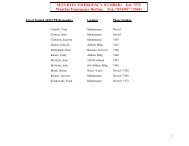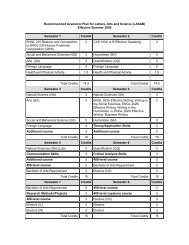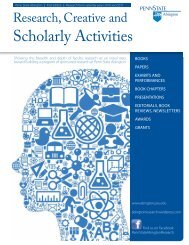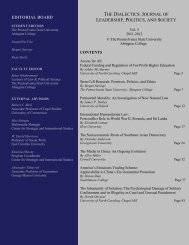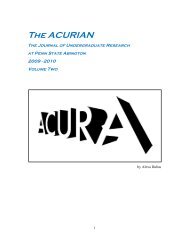Vol. III - Penn State Abington
Vol. III - Penn State Abington
Vol. III - Penn State Abington
You also want an ePaper? Increase the reach of your titles
YUMPU automatically turns print PDFs into web optimized ePapers that Google loves.
whose sole job is to promote an environment of respect for personal property. Hence, under their<br />
social contract, Americans gave up the right to bear arms in exchange for the security that the<br />
police force provides. This argument presupposes that the right to bear arms clause of the Second<br />
Amendment is “limited or qualified” (McAffee, 2008) by the Militia Clause that precedes it. A<br />
second argument proposed is that the idea of individual gun ownership does not translate into<br />
modern society because our philosophical leanings and material security has changed, rendering<br />
individual gun ownership right claims irrelevant.<br />
In The Founders’ Second Amendment, Stephen Halbrook breaks down the Second<br />
Amendment and discusses what he believes each clause means. He states that the amendment<br />
declares “a political principle about the militia, followed by a clause declaring a substantive<br />
right” (2008). In conjunction with the First Amendment, Halbrook argues that the Second<br />
Amendment is supposed to be an individual right. Furthermore, Halbrook notes, the Second<br />
Amendment ensures that the citizen’s Fourth Amendment rights “to be secure in their persons,<br />
houses, papers, and effects” are protected and that the right to bear arms is a right conferred<br />
solely to the individual and not for the states to control. The Second Amendment, according to<br />
Halbrook, clearly differentiates between “the militia,” “the people,” and “the <strong>State</strong>.” None of<br />
these groups are used interchangeably. Instead, they are referred to separately in order to<br />
specifically grant “the people” the right to bear arms, to acknowledge the necessity of “the<br />
militia,” and to separate “the state” from “the people.” Halbrook strongly argues that to assume<br />
that this right can be abridged in any way is to undermine the entire spirit of the Bill of Rights<br />
(2008).<br />
To interpret the wording “to keep and bear arms” and to better understand what the words<br />
may have meant to the Founders, Halbrook uses the dictionary constructed by Noah Webster, the<br />
famous American lexicographer contemporary to the time of the Revolution. In the dictionary,<br />
Webster defines “keep” as the ability to have in one’s possession, to retain which includes the<br />
household or the individual’s property (Halbrook, 2008). The inability to “keep” a gun was seen<br />
as a mark of inferiority to the colonists, since laws prohibited slaves from owning a firearm<br />
(Halbrook, 2008). To be considered the same status as a slave was an insult. Halbrook also notes<br />
that weapons for a general militia were traditionally kept in a common storehouse and that the<br />
Amendment specifically delineates the individual’s right to keep arms (2008).<br />
As for the term “bear” in Webster’s dictionary, the word was defined as “to carry or to<br />
wear; to bear as a mark of authority or distinction; as, to bear a sword, a badge, a name; to bear<br />
arms in a coat” (Halbrook, 2008). Traditionally, during this period soldiers carried their arms in<br />
their hands, and officers holstered their pistols at their side. The other way to “bear” arms during<br />
this period was to carry small pistols on one’s person, which some did. Halbrook hence<br />
concludes that the right to “bear” arms was not granted specifically to a state militia but instead<br />
given to each individual citizen (2008).<br />
The next phrase Halbrook proceeds to define is “shall not be infringed.” A number of<br />
amendments in the Bill of Rights have similar phrases that note the limitations of the<br />
government. The First Amendment, for example, uses the word “abridging” in the context of the<br />
government’s ability to limit the freedom of speech and the press, the Fourth Amendment notes<br />
that the right to be free from unreasonable searches and seizures “shall not be violated,” and the<br />
Ninth Amendment uses “deny or disparage” to limit the interpretation of the Constitution in such<br />
a way that would limit certain rights retained by the people (Halbrook, 2008). According to<br />
Halbrook, the phrasing, placed in the context of the other amendments, suggests that the Second<br />
Amendment does not allow for any restriction on the right to bear arms.<br />
THE DIALECTICS ▲ 2009<br />
www.abington.psu.edu/dialectics<br />
48



